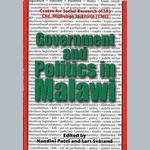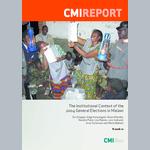Lars Gerhard Svåsand is no longer affiliated with CMI.
Publications
Journal Article | 2005
Stuck in Transition: Electoral Processes in Zambia 1991-2001.
Zambia has held three multiparty elections since its restoration of democracy in 1991. This peaceful transition raised expectations of a smooth process towards democratic consolidation. But similar to experiences from...
Lise Rakner and Lars Svåsand (2005)
in Democratization vol. 12 no. 1 February pp. 85-105

Journal Article | 2004
From dominant to competitive party system: The Zambian experiences 1991-2001
In this article we analyse the changes in the party system in Zambia in the period 1991 to 2001. Based on changes observed in terms of the number of parties,...
Lise Rakner and Lars Svåsand (2004)
in Party Politics vol. 10 no. 1 pp. 49-68
Journal Article | 2003
The quality of electoral processes: Zambian election 1991-2001
In this article the authors have assessed the elctoral process in Zambia across three consecutive elections. They argue that the quality of the elections, in terms of voter participation (registration),...
Lise Rakner and Lars Svåsand (2003)
in African Social Research vol. 2000/2001 no. nos. 45/46 pp. 1-23
Journal Article | 2002
Political parties and democratic consolidation in Africa
Lars Svåsand and Vicky Randall (2002)
in Democratization vol. 9 no. 3 pp. 30-52
Journal Article | 2002
Party institutionalization and the new democracies
Lars Svåsand, Vicky Randall (2002)
in Party Politics vol. 8 no. 1 pp. 5-29

Edited Book | 2007
Government and Politics in Malawi
The textbook provides a comprehensive coverage of the main concepts, institutions and mechanisms of Government and Politics, with particular reference to Malawi. Combining a historical perspective with current developments, this...
Nandini Patel and Lars Svåsand (Eds.) (2007)
Zomba, Malawi: Centre for Social Research (CSR) and Chr.Michelsen Institute (CMI) (Kachere Books 33) 420 p.
Book Chapter | 2005
From Dominant to Competitive Party System. The Zambian Experience 1991-2001
Lise Rakner and Lars Svåsand (2005)
in Ivar Kolstad and Hugo Stokke, eds.: Writing Rights: Human Rights Research at the Chr.Michelsen Institute 1984-2004. Bergen: Fagbokforlaget pp. 59-77
Book Chapter | 2001
Party institutionalisation and the new democracies
Lars Gerhard Svåsand and Vicky Randall (2001)
in Democracy and political change in the "Third World". London: Routledge pp. 75-96

CMI Report | 2006
The Institutional Context of the 2004 General Elections in Malawi
This report summarises the findings of a joint research project undertaken by the Centre for Social Research, Chr. Michelsen Institute and the Universities of Malawi and Bergen. Ensuring that elected...
Siri Gloppen, Edge Kanyongolo, Nixon Khembo, Nandini Patel, Lise Rakner, Lars Svåsand, Arne Tostensen and Mette Bakken (2006)
Bergen: Chr. Michelsen Institute (CMI Report R 2006: 21) 38 p.
CMI Report | 2004
Poverty reduction strategy processes in Malawi and Zambia
Malawi and Zambia are poor and heavily indebted countries whose dependence on foreign aid is pronounced. They both qualify for debt relief in terms of the Heavily Indebted Poor Country...
Edgar Bwalya, Lise Rakner, Lars Svåsand, Arne Tostensen, Maxton Tsoka (2004)
Bergen: Chr. Michelsen Institute (CMI Report R 2004: 8) 33 p. (Commissioned by NORAD)
CMI Report | 2002
Funding political parties in emerging African democracies: What role for Norway?
This report addresses the problem of foreign funding of political parties in newly democratised African states. The report identifies some problems associated with the development of political parties in Africa...
Harald W. Mathisen and Lars Svåsand (2002)
Bergen: Chr. Michelsen Institute (CMI Report R 2002:6)
CMI Report | 2002
Multiparty elections in Africa's new democracies
Why has the electoral process in the newly democratised African states had such limited impacts? How can the continued one-party dominance on the continent be explained despite the reintroduction of...
Lise Rakner and Lars Svåsand (2002)
Bergen: Chr. Michelsen Institute (CMI Report R 2002:7) 34 p.
CMI Working Paper | 2005
Maybe free but not fair: Electoral administration in Malawi 1994-2004
Entering the third decade of multiparty democracy on the African continent, incumbents appear able to secure electoral mandates without opening for extensive political liberties. The paper argues that the administration...
Lise Rakner, Lars Svåsand (2005)
Bergen: Chr. Michelsen Institute (CMI Working Paper WP 2005: 5) 18 p.
CMI Working Paper | 2005
Fissions and fusions, foes and friends: Party system re-structuring in Malawi in the 2004 general elections
The issue of presidential term limits is emerging as an important political norm on the African continent, but the effects of the third term debates on the institutionalization of the...
Lise Rakner, Lars Svåsand (2005)
Bergen: Chr. Michelsen Institute (CMI Working Paper WP 2005: 6)
CMI Working Paper | 2003
Uncertainty as a strategy: Electoral processes in Zambia 1991-2001
Zambia has held three multiparty elections since its restoration of democracy in 1991. This peaceful transition raised expectations of a smooth process towards democratic consolidation. But similar to experiences from...
Lise Rakner and Lars Svåsand (2003)
Bergen: Chr. Michelsen Institute (CMI Working Paper WP 2003:13) 21 p.
Conference Paper / Presentation | 2005
Fissions and Fusions, Foes and Friends. Party system restructuring in the Malawi 2004 elections
Lise Rakner and Lars Svåsand (2005)
Presented at: Norwegian Association of Political Science Annual meeting, January 5-7
Projects
Political instiutions in Africa: Zambia, Malawi and Uganda compared
Jan 2006 - Dec 2006
The institutional context of the 2004 general elections in Malawi
Aug 2003 - Jul 2006
The participatory aspects of poverty reduction strategies in Malawi and Zambia
Oct 2002 - Dec 2003